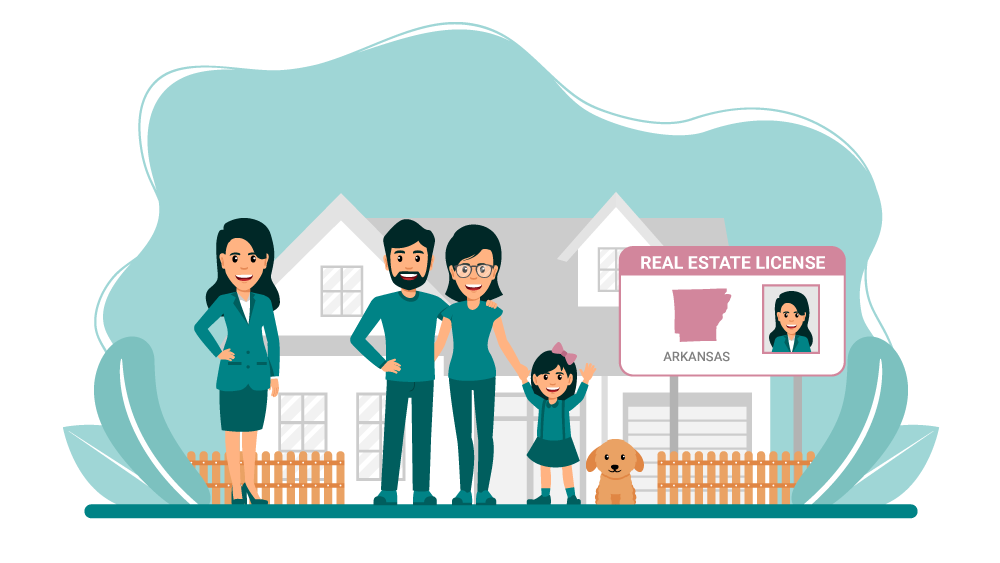Taking any exam is nerve-wracking, but for most real estate professionals, it’s been years since they’ve been in school. As a result, you’re not exactly in practice when it comes to studying and test-taking.
Fortunately, it’s not too difficult to prepare for your real estate exam. This real estate study guide, which includes sample questions, will help you find the most effective way to study and give you confidence for the test.
Here are the tips and tricks you need to prepare. You’ll do great!

Know Your Studying Style
A lot of students stick with written notes for real estate exam prep, but that’s not the best method for everyone. There are a variety of different learning styles, and each one is different when it comes to preparing for a test.
Visual Learners
Visual learners prefer to use images, maps, drawings, and other visual representations to understand information. If you’re a visual learner, you may feel frustrated at your inability to effectively retain information that you’ve read.
The good news is that there are great ways for visual learners to study for exams. Try mind mapping, where you draw out the concepts you’ve learned and how they are related. You can get an incredible amount of information on one page, and it’s much easier to learn for visual types.
Auditory Learners
Those who learn best from what they hear are auditory learners. The easiest way for you to study is to record lectures and study sessions and play them back for yourself. After hearing the information a few times, you can remember and recall it when needed.
You can also use mnemonic devices to help you remember key concepts and ideas. These include acronyms, rhymes, and even the Method of Loci.
Read and Write
Those who learn best through reading and writing do well with traditional study methods. You’ll want to read the text, take notes, and use highlighting or underlining to mark critical concepts in the course material.
You may also benefit from a written outline of the material or studying bulleted lists of ideas.
Kinesthetic Learners
If you find that the hands-on approach is the best way for you to retain information, you’re a kinesthetic learner. It can seem difficult to study for an exam in a hands-on way, but it can and has been done successfully for years.
Use Post-It notes to create flowcharts of information on your wall, connecting ideas with string. Create graphs and charts as you study information. Use flashcards.
One surprising way that kinesthetic learners can study well is by combining physical activity with your study. Read your notes while on a treadmill, for example, or review flashcards as you use an elliptical.
Keep Your Study Sessions Focused
Getting your real estate license can help you change your life and be very rewarding. Depending on your desired real estate career path, you may be able to make your schedule and work the hours you decide. You will be able to help your clients reach their dreams.
But before you get there, you have a lot going on in your life. You may have family, kids, pets, or even another job that demand your attention. Of course, there are also always chores to do and errands to run.
Don’t let that discourage you. You can study in focused sessions. Here are some tips.
Set Goals for Each Session
To avoid feeling overwhelmed, focus each study session on a specific goal. For instance, you may decide to focus on each unit individually until you get through them all.
As you study, stick to the plan. Don’t be distracted by other topics or overwhelmed by future sections. When you’ve finished, review how well you did in meeting your goal. You may need to adjust your ambitions for the next session – by scaling down or even by adding more!
Use a Timer
Do you ever find yourself losing track of time? This can be especially challenging with online learning as distractions are everywhere. A timer is also a great visual reminder that you don’t have time to waste. Having a timer going can help you make sure you stick to your study time and don’t go over.
When a timer is going right next to you, it’s harder to say, “Oh, I’ll just take a moment to throw a load of laundry in,” or fall prey to some other distraction — looking at you Facebook!
Get a Distraction Blocker for Your Computer
A lot of us use our computers for studying and practice. However, it’s much too easy to open a social media platform for “just a minute,” and before you know it, it’s an hour later. It’s just like getting distracted on the road – frustrating and a waste of time.
Using a distraction blocker like FocusMe or Cold Turkey is a great option. They block specific websites for a certain amount of time. You can still study and search the web without being distracted by Facebook, Reddit, or other sites!
Use Best Practices For Passing the Real Estate Exam
The best way to set yourself up for success on an exam is to take as many practice exams as possible. This real estate prep guide includes some sample questions for you, but you’ll want to use other techniques as well.
Answer Easy Questions First
There are often questions that you will immediately know the answers to, which is fantastic. You can build your confidence by answering these first and then going back to the questions you were less sure of.
Eliminate Answers to Get to the Right Choice
Many times, you’re able to eliminate answers that you know are wrong, which will help you improve your chances if you do have to guess.
If you can eliminate two of the choices, you have a 50% chance of being right. Go with your gut for the final answer.
Don’t Change Answers
Unless something later in the test reveals the answer to a previous question, don’t go back and change your answers. Most of the time, your first gut reaction was right. Statistically, you are much more likely to change your response to the wrong choice for the question than the other way.
Don’t Keep Score
Try not to worry about your score as you move through the exam. It may discourage you. Instead, it is good practice to answer the questions to the best of your ability.
Also, don’t feel like you have to “beat” other applicants. You can use as much of the testing time as you need. Don’t worry if you’re the last one done – or the first!
Answer Every Question
Unanswered questions are automatically wrong. You may as well guess! Be suspicious of “always” and “never.”
If you’ve never heard of it before, don’t choose it as an answer. If you’ve been studying, you’re not likely to hit something you’ve never heard of.
Sample Questions to Help Your Real Estate Study
You can find a free real estate practice exam online, but the more you practice, the better. Here are some real estate exam questions you can use to help you as you study.
- Which one of these is NOT a Negative Easement?
a. Easements of air
b. Easements of support
c. Easements of access
d. Light easements - Foreclosure occurs when a ____ seizes and sells a borrower’s ____ after the borrower has failed to ____ the lender.
a. lender, collateral, repay
b. bank, personal property, appreciate
c. bank, property, notify
d. lender, home, alert - A buyer agrees to purchase a home once the sale on their current home is completed. Legally this is known as a __________.
a. specific performance
b. negotiation
c. contingency
d. option agreement - How many square feet in one acre?
a. 24,650
b. 55,430
c. 43,560
d. 46,530 - Mr. and Mrs. Conners sold their home and paid an 8% commission to their realtor. Assuming no other fees, if they walked away from the sale with $306,000, about how much did their house sell for?
a. $332,600
b. $328,400
c. $327,900
d. $330,400 - Which of the following is a violation of the Fair Housing Act?
a. a private club that provides lodging and gives preferential treatment to club members
b. not renovating second-story apartments to accommodate residents with disabilities
c. not allowing a service dog in an apartment complex that doesn’t allow pets
d. refusing to rent to someone who does not meet economic qualifications - A real estate agent declines to show a Muslim couple a house in a neighborhood because she feels the area isn’t Muslim-friendly. This is known as what?
a. blockbusting
b. good faith exemption
c. redlining
d. steering - According to HUD standards, which of the following would be an acceptable neighborhood advertisement?
a. “Exclusive neighborhood”
b. “Senior Housing”
c. “Traditional living”
d. “Muslim-friendly” - How does a home equity line of credit differ from a second mortgage?
a. With a home equity line of credit, the borrower can draw money as they need it.
b. The terms can be used interchangeably.
c. A home appraisal is not necessary for a home equity line of credit.
d. The interest accrued on a home equity line of credit is not tax deductible. - Market value is different from market price in that market price ___.
a. is not the actual value, but just an idea
b. is a fact that has actually occurred
c. is always 10% below market value
d. is taxable and market value is not
Answers to Sample Questions:
- C
- A
- C
- C
- A
- C
- D
- B
- A
- B
Great Studying Can Help You Succeed on the Real Estate Exam
Preparing for the real estate exam can seem intimidating, but using the techniques in this real estate study guide, you can succeed.
Identify your learning style and tailor your studying accordingly. Avoid distractions and use best practices to help you find the answers. Most of all, take a lot of practice tests, starting with these sample questions.
If you are interested in pursuing or enhancing your career in real estate, be sure to explore the real estate education section of Approved Course.




